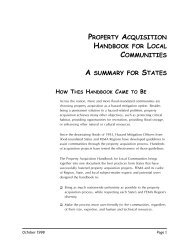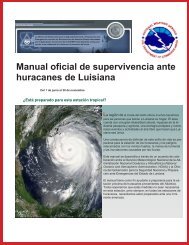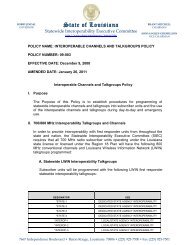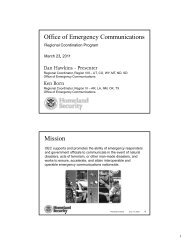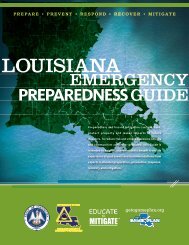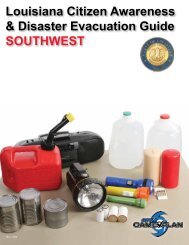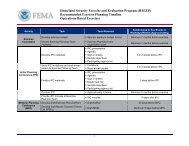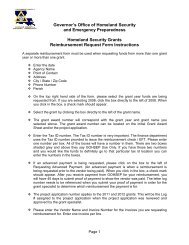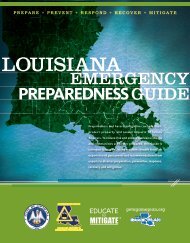Before the Federal Communications Commission Washington, D.C. ...
Before the Federal Communications Commission Washington, D.C. ...
Before the Federal Communications Commission Washington, D.C. ...
- No tags were found...
Create successful ePaper yourself
Turn your PDF publications into a flip-book with our unique Google optimized e-Paper software.
<strong>Federal</strong> <strong>Communications</strong> <strong>Commission</strong> FCC 02-64APPENDIX CFINAL REGULATORY FLEXIBILITY ANALYSISAs required by <strong>the</strong> Regulatory Flexibility Act of 1980, as amended (“RFA”), 191 an Initial RegulatoryFlexibility Analysis (“IRFA”) was incorporated into <strong>the</strong> Notice of Proposed Rulemaking (“NPRM”) inEB Docket No. 01-66. 192 The <strong>Commission</strong> sought written public comments on <strong>the</strong> proposals in <strong>the</strong>NPRM, including comments on <strong>the</strong> IRFA. No comments were filed in direct response to <strong>the</strong> IRFA. ThisFinal Regulatory Flexibility Analysis (“FRFA”) conforms to <strong>the</strong> RFA.A. Need for, and Objectives of, <strong>the</strong> Report and OrderThis Report and Order amends <strong>the</strong> technical and operational requirements for <strong>the</strong> Emergency AlertSystem (“EAS”). Many of <strong>the</strong> amendments adopted in this Report and Order are intended to enhance <strong>the</strong>capabilities and performance of <strong>the</strong> EAS during state and local emergencies, which will promote publicsafety. In addition, <strong>the</strong> Report and Order amends <strong>the</strong> EAS rules to make compliance with <strong>the</strong> EASrequirements less burdensome for broadcast stations, cable systems and wireless cable systems. ThisReport and Order also eliminates rules which are obsolete or no longer needed.B. Summary of Significant Issues Raised by Public Comments in Response to <strong>the</strong> IRFANo comments were filed in direct response to <strong>the</strong> IRFA. The <strong>Commission</strong>, however, has considered <strong>the</strong>potential impact of <strong>the</strong> rules proposed in <strong>the</strong> NPRM on small entities and has reduced <strong>the</strong> complianceburden for broadcast stations and cable systems as discussed in paragraphs 48-53 and 66-75 of thisReport and Order.C. Description and Estimate of <strong>the</strong> Number of Small Entities to Which <strong>the</strong> Rules Will ApplyThe RFA directs agencies to provide a description of and, where feasible, an estimate of <strong>the</strong> number ofsmall entities that may be affected by <strong>the</strong> rules adopted herein. 193 The RFA generally defines <strong>the</strong> term“small entity” as having <strong>the</strong> same meaning as <strong>the</strong> terms “small business,” “small organization,” and“small governmental jurisdiction.” 194 In addition, <strong>the</strong> term “small business” has <strong>the</strong> same meaning as <strong>the</strong>term “small business concern” under <strong>the</strong> Small Business Act. 195 A small business concern is one which:(1) is independently owned and operated; (2) is not dominant in its field of operation; and (3) satisfies191See 5 U.S.C. § 603. The RFA, see 5 U.S.C. § 601 et seq., has been amended by <strong>the</strong> Contract With AmericaAdvancement Act of 1996, Pub. L. No. 104-121, 110 Stat. 847 (1996) (“CWAAA”). Title II of <strong>the</strong> CWAAA is <strong>the</strong>Small Business Regulatory Fairness Enforcement Act of 1996.192Notice of Proposed Rulemaking, Amendment of Part 11 of <strong>the</strong> <strong>Commission</strong>’s Rules Regarding <strong>the</strong>Emergency Alert System, 16 FCC Rcd 7255, 7271-76 (2001).1931945 U.S.C. § 604(a)(3).5 U.S.C. § 601(6).1955 U.S.C. § 601(3) (incorporating by reference <strong>the</strong> definition of “small business concern” in 15 U.S.C. §632). Pursuant to <strong>the</strong> RFA, <strong>the</strong> statutory definition of a small business applies “unless an agency, after consultationwith <strong>the</strong> Office of Advocacy of <strong>the</strong> Small Business Administration and after opportunity for public comment,establishes one or more definitions of such term which are appropriate to <strong>the</strong> activities of <strong>the</strong> agency and publishessuch definition(s) in <strong>the</strong> <strong>Federal</strong> Register.”50




